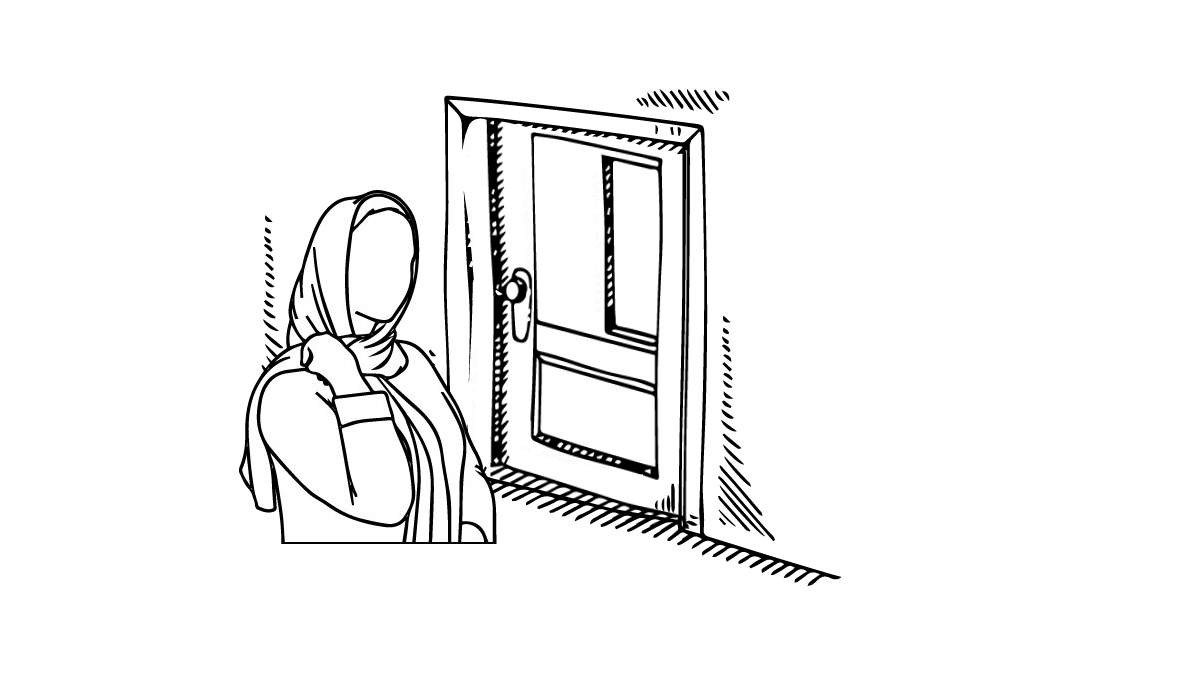House Hunt Horror: Struggles of Indian Women Finding A Place on Rent
A crowdsourced story supported by data, with anecdotes from women who’ve house-hunted in various Indian cities.

A crowdsourced story supported by data, with anecdotes from women who’ve house-hunted in various Indian cities.

It’s 2023, yet finding housing, especially on rent, is a struggle – particularly if you are a woman, and worse if single. Over a few weeks, HerZindagi conducted research, to find out about the good, bad and ugly of trying to find housing.
What we found was a surprising tale of varied forms of discrimination, based on prejudices, stereotypes and archaic mindsets. The common thread? A need to control every aspect of a woman’s life, from her food choices to who visits her. Some of these control tactics may not be gender-specific, but the horror is real nonetheless.
We got responses to our survey from 100 women, of different age groups, marital status, and religions. They spanned over 12 Indian cities, including popular metropolitans like Delhi, Mumbai, and Bengaluru, besides Ahmedabad, Chandigarh, and Ranchi.
From single mothers to trans women, we got responses from a variety of women.
Responses were gathered through a detailed questionnaire on Google Forms, which gave them information about the story, and why we’re doing it. From unsolicited relationship advice to assumed food habits based on surnames, we heard it all.

Although most respondents were Hindu, we did hear from Muslim, Sikh, Christian, Buddhist, and Jain women too.
Four out of the six Muslim respondents said they’d faced discrimination based on their religion.
Sana, a creative strategist looking for a place in Mumbai, said she’s not only been told upright that she can’t be given a house on rent because she’s a Muslim but also received unsolicited advice from brokers about being “accepted.”
“The broker told me to make a fake Aadhaar card to pass off as a Hindu because I don't 'look' Muslim,” she said. In another instance, she was asked to vacate a place she was subletting because the owner found out that she was Muslim; the person subletting had not informed them intentionally.
Some owners allowed me to stay provided the paperwork is done in my (Hindu) husband's name.Arefa Johari, Journalist in Mumbai
“The entire househunting process, as a queer Muslim woman absolutely obliterates my mental health. Being told to lie about my religion, and owners rejecting me in subtle ways made me realise how many microaggressions there are,” she sighed.
Arefa Johari, a journalist in Mumbai, said some landlords allowed her to stay “provided the paperwork is done in my (Hindu) husband's name.”
She narrated another incident where a landlord in central Mumbai said he no longer wants to rent to Muslims because of an incident, a ‘haadsa,’ that happened with the previous Muslim tenant. “That incident was not a theft or an altercation or anything criminal – the ‘haadsa’ was that the tenant's relatives often came to meet him, and they wore visibly ‘Muslim’ clothing, which made Hindu neighbors ‘insecure’,” she said.
Zeishah Amlani, a media professional, said that brokers would ask for her PAN card or other documents for identification, see the names of her Islamic parents, and outright reject her as a potential tenant.

A job in a new city, away from one’s hometown, is one of the primary reasons women look for places on rent. While we applaud women for entering the workforce, there seems to be widespread judgment about the career path they picked.
I have been denied several houses because I’m a ‘female lawyer’. Apparently, we are overconfident, cunning, and capable of dragging the landlord/broker to courtsToshani Mukherjee, Lawyer in Delhi
Our respondents worked in fields varying from law, journalism, media, to architecture, geology, and engineering. Despite the differing professions, discrimination was a constant.

Toshani Mukherjee, a 27-year-old lawyer in Delhi, said, “I have realized that brokers and landlords alike, have an innate inhibition relating to renting houses to female lawyers. I have been denied several houses on the same grounds. Apparently, we are overconfident, cunning, capable of dragging the landlord/broker to courts, etc.”
In another instance, an owner refused to even talk to her because “he (a 50-year-old doctor) didn’t want to engage with a woman who has chosen law as her profession because that speaks lowly of one’s character.”
Those working in the media or journalism didn’t have it easier.
Shilpi Barui, a media professional in Hyderabad, narrated what happened when she reached her house around 1:30 am one night to find the gates locked. Despite knocking when nobody opened it, she called another colleague who lived there and asked him to ask the caretaker living on the premises to open the gates.
“The caretaker, drunk at that point, put on a drama that the keys couldn't be found. I asked him to break open the lock and he refused. "‘Raat ko yeh ladkiyan kaun sa office mein kam karti hai humein malum hai’ (‘I know which office these girls work in at this time of the night’) were his comments followed by filthy words and threats thrown at me in Hindi,” she said. “He also called one of his fellows who lived within the same premises to add fuel to his drama. All this went on for two hours. Fearing risk to life, I called the police for help. The police arrived but refused to take an official complaint. The caretaker was let off with just a warning.”
If owners allowed a certain profession, their assumptions about what happens in that profession were made clear. Smriti Kiran, a journalist in Delhi, faced questions regarding her income, with the underlying assumption that journalists don’t get paid well, and thus won’t pay rent on time.
Night shifts or UK timings that needed women to work late into the evening or night were looked down upon, or treated with suspicion. In keeping with patriarchal notions common in Indian society, both brokers and house owners found it acceptable to advise women on how they should lead their lives.
Manjuleeka Sen, a filmmaker who house-hunted in Mumbai, said, “The erratic work schedule is frowned upon, and we are judged as more liberal and would tend to not have an orthodox lifestyle, which includes smoking, drinking, being friends with the opposite gender and late-night parties.”
Owners sometimes even made it clear that they preferred certain professions over others. Gunjan Dey, a textile designer, heard from owners that they prefer “bankers or those with a more corporate work culture”.

Around 46% of respondents who were house hunting with a pet said that they faced discrimination based on this.
Aastha Jindal, 26, was house-hunting in Pune with her adopted cat. After finding many societies and houses that weren’t pet-friendly, she finally found a house. She gave the owner all the details about her, her pet, her lifestyle and where she worked beforehand. What followed still came as a shock to her.

“A week after I shifted, they started saying they were not okay with the cat and that I should put him up for adoption. They even suggested that they would help put up posters to help with the process. They said ‘We have furniture in the house, cats leave fur around, we don't want an animal in the house.’” said Aastha. “I was continuously asked to vacate. I had to eventually leave in a month, as it felt unwelcome and unsafe. I lost the brokerage, and a chunk of my deposit.”

If the owners were okay with their profession and religion, they faced policing regarding their food choices. In a society that has historically witnessed widespread caste discrimination, food habits were often even assumed by owners.
Around 40% of respondents said they faced discrimination based on their food habits.
Among non-vegetarian respondents, the problems were manifold.
A broker showing a house in Noida to Padmashree Pande, who’d taken up a new media job and shifted base from Pune, took a look at her name and said, “Oh since you’re a Brahmin, food habits won’t be a problem”, before she even said anything about food choices.
Some heard jibes like, “Why are you eating non-veg on Tuesday and Thursday?”, while others like Urvashi Trivedi, a lawyer in Ahmedabad, was told eating non-veg is “sinful” or against religious beliefs.
In another case, restricting food choices became a garb for something else entirely.
“It was pretty obvious that the ‘non-veg food’ was just an excuse to say no to a Muslim. My husband eats meat too, but he has a Hindu name and has never been asked whether he is vegetarian or non-vegetarian,” said Aarefa Johari.

If religion was kept aside, assumptions were made based on hometowns or culture.
You’re a Bengali, so you must be eating fish; that’s not allowed in our houseDebiprna Chakraborty, Journalist in Delhi
One landlady interviewed Debiparna Chakraborty, a freelance journalist, for almost 10 minutes or so before saying, "Aap toh Bengali ho, aap to machhi khaate honge. Humare ghar me toh allowed nahi. (You’re a Bengali, so you must be eating fish; that’s not allowed in our house).” The room she was looking at was in a different part of the house altogether.
While Debiparna was ‘expected’ to be non-vegetarian, because she was a Bengali, Geetu Katyal, another journalist, faced the opposite kind of remarks, as a vegetarian Punjabi. She was asked “How come you’re a Punjabi, and you don’t eat chicken?!”.
The level of stringency differed from city to city.
While some owners only hinted at a preference, others liked to ensure obedience in all ways possible. Ahana Sen, an architect, said, “In Ahmedabad, most apartment agreements have the ‘no non-veg, no alcohol’ condition mentioned, and we have to sign it off on legal documents too.”
Sometimes even if landlords don’t mind, buildings and complexes impose rules about food. “In Mumbai there are entire buildings which have bylaws stating that you can't cook and/or eat non-veg on the premises,” said Sinjini Majumdar, a lawyer.
“A friend of mine used to live in such a building and she would order non-veg sometimes and then had to call up the delivery guy and ask him to lie about the food because the guard always asked what food was entering the building,” she added.


Over half the respondents, 55 out of 100, said they faced discrimination based on their marital status, as landlords prefer families or married couples over single women or couples wanting to live in.
Despite live-in relationships being recognized by law, Debiparna, who was looking for a place with her partner, faced many amusing incidents in Delhi. “One time a broker lied to the owners about us being married without consulting us,” she said. “Obviously, it came out when we went to see the place and the broker started lying even harder: ‘They are engaged… their parents will visit’, nearly begging the owner. We were shocked.”
If it wasn’t hard enough to find a house, some owners even imparted unsolicited relationship advice. Toshani, the lawyer househunting in Delhi, narrated, “I was told I should first find a boy and get married, considering I am ‘of age’ and only then look for a house.”
Sinjini Majumdar, the lawyer who while looking for accommodation in Mumbai faced a unique issue where her unmarried status led owners to assume she wouldn’t need a functional kitchen in the house. “There was an instance where the flat was a new construction and the landlord was refusing to put in basic kitchen shelves because they just assumed that a bunch of unmarried women ("bachelors") don't need to use a kitchen and will keep on ordering food or eating out, because we are not a "family" and only families cook food,” she recalled.


Owners sometimes assume a certain lifestyle for potential tenants because they are girls or women.
“The owner said the reason for keeping girls is that they don't drink and smoke. If you had to throw a party, the owner needed to talk to our parents before giving permission,” said Estuti Bajpai, a tech journalist.

The caretaker said, ‘Itne sare ladkon se kya kaam karti hain?’Shilpi Barui, Media Professional in Hyderabad
A lot of owners categorically specify that no boys can come over, parties cannot be hosted, smoking or drinking are strictly not allowed, and no loud noise or music should emanate from the house. While it may sound reasonable in parts, the overall meaning is clearly to control and police.
In a bid to ensure the policing, one owner in Delhi even told Padmashree he personally oversees this. “A landlord said that he likes to come over at 7 pm every day to see what activities the female tenants are up to. He also said that he keeps a spare key and uses that to enter the house.”
Shilpi Barui faced a harrowing incident on her birthday when a few colleagues came over to wish her. “The main gate was closed on their face saying they were ‘not allowed’. Since there were more male colleagues in number the caretaker blatantly said, ‘Itne sare ladkon se kya kaam karti hain?’”
Sahita Ghosh, a data scientist living in Pune, was even called names for having male friends over.
Sometimes owners came up with the most bizarre reasons for restricting guest visits. “It’s usually always an issue that no boys can enter the house,” said Toshani, the lawyer. “It somehow demeans the integrity and dignity of the landlord. I have also been told that if I have boys over (albeit, friends/colleagues), it will ‘negatively’ impact the landlord’s daughter who will learn ‘wrong’ practices.”
Even clothing is scrutinised. “A landlord refused to show us his house because one of us was wearing shorts. Mind you, it was peak summer in Delhi,” Toshani added. “We have also faced underhanded slut shaming and character assassination from several house owners and brokers, that too in the poshest areas of South Delhi.”
Smoking is looked down upon, regardless of area, religion and other factors. “Women smoking is just seen as a threat to the "traditional" image of women,” said Rumjhum, a film editor. She is referring to the traditional archetype which expects women to be pious, restricted to homes and “pure”. “Women who smoke are misunderstood, bullied, embarrassed, threatened and occasionally attacked not only by men but also by their own kind,” she added.
If owners agree to let women lead their lives, they sometimes assume that young women require no privacy. Sinjini, the lawyer in Mumbai had almost finalised a house with two flatmates and even paid a token deposit amount to lock it for themselves when they realised a horrifying detail.
“We realised that the landlords wanted to drop by and enter the flat with their own set of keys whenever they pleased, without informing in advance,” said Sinjini. “They even wanted to get dressed and ready for functions there, when these events were in South Bombay (the flat being rented was in South Bombay but the landlords were living in the suburbs, quite a distance away). Somehow they thought this was a completely normal thing to do and basically disregarded the fact that there's something called privacy. They said, "you know beta, we are like family". Thankfully we figured this out before moving in so we never rented the place.”

Kash Chhetri, a 21-year-old trans woman from Darjeeling, has it harder while finding a house in Delhi because of her gender. She ran away from her orthodox home at 17 and has since had to house-hunt four or five times in Delhi.
“Brokers wouldn’t show me good houses, or dilly-dally endlessly, after knowing I’m a transgender person,” she said.

Owners even tend to charge higher or dupe her, as they know how hard it is for trans people to find housing.
“They’d even ask me to my face, ‘yahaan taali-waali nahi bajaoge na?’ (‘We hope you won’t be clapping aloud’ – a reference to how transgender people traditionally perform on happy occasions),” she narrated. “This would happen despite me wearing my work ID card.”
They’d even ask me to my face, ‘yahaan taali-waali nahi bajaoge na?’Kash Chhetri, Social worker in Delhi
Regional differences were often highlighted while women looked for housing.
Estuti Bajpai, who was looking for a flat in Mumbai, came across judgement and regional stereotyping, based on the fact that her hometown was Uttar Pradesh.
“A broker showed me the flat and everything was okay, but when the owner came to know that my hometown is in UP, I was told that they couldn't rent me the flat as they thought people who belong to UP are very violent and not civilized enough,” she recalled. “This was a very strange reason but this is exactly what I was told,” she added.
Women were left puzzled by how swiftly owners used blanket judgments to comment on people’s hometowns and then held these against probably tenants in order to to not rent out flats.
These are only some of the many issues women continue to face while house-hunting. Scams, scheming brokers, and harsh weather conditions are factors that affect all, but discrimination and scrutiny of every aspect of her being, is what makes this experience a dreaded one for women.
